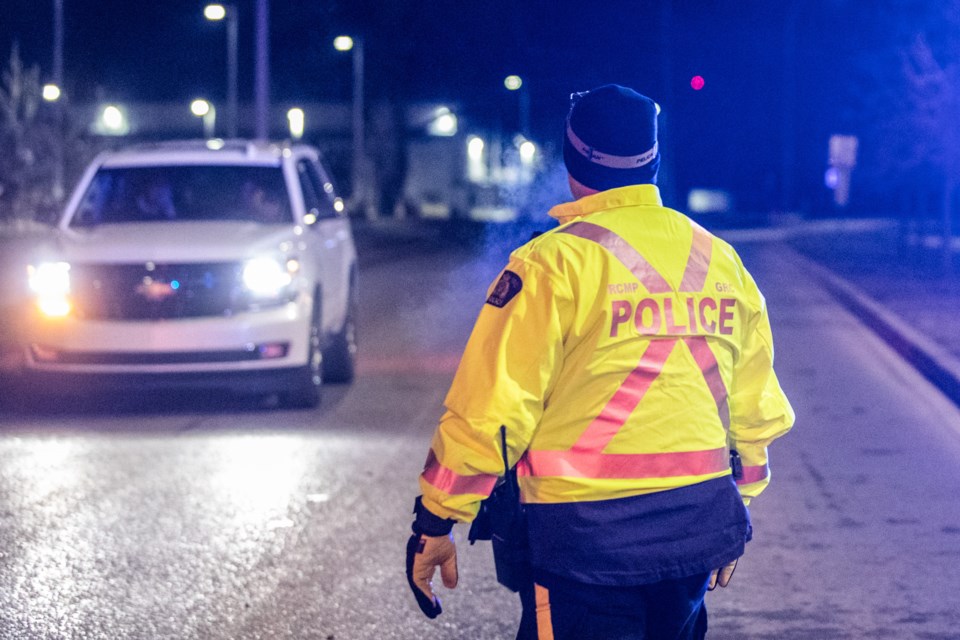Imposing immediate sanctions on drunk drivers has Okotoks RCMP hopeful the number of impaired offences will decrease.
The Province of Alberta instituted new rules for impaired drivers, which came into effect Dec. 1 and will allow officers to issue fines, suspend licences and seize vehicles on-site.
Previously, impaired drivers would be arrested, taken to the detachment for testing, and if they registered over the legal limit of 0.08 blood alcohol concentration (BAC) a criminal charge would be applied.
“With that, they received a licence suspension, which was 90 days followed by one year with the eligibility to participate in the ignition interlock after a certain amount of time,” said Okotoks RCMP Cpl. Chris Hrynyk. “The new legislation is now a little different.”
For a first offence, when a driver fails their roadside BAC test they will be issued a $1,000 fine plus a surcharge to victim services, for a total of about $1,200. In addition, they receive a 90-day suspension and a 30-day vehicle seizure, with a 12-month interlock program.
Second-time offenders are subject to a 90-day suspension, 30-day vehicle seizure, 36-month interlock program and $2,000 fine plus surcharge, and for a third offence there is a 90-day suspension, 30-day seizure, $2,000 fine plus surcharge, and a lifetime ignition interlock.
However, officers may still make a decision on the spot to arrest an impaired driver and charge them criminally as well, said Hrynyk.
“That can still occur, and it depends on different factors we would take into consideration that are aggravating the situation – repeat offenders, if a collision is involved, if children are in the vehicle, things like that,” he said.
There is still zero tolerance for commercial vehicles.
Novice drivers also have no tolerance and are subject to $200 fines plus surcharge, a 30-day driver’s licence suspension and seven-day vehicle seizure. In addition, these drivers must remain suspension-free for a full year from the end-date of their suspension prior to applying for a full licence.
New rules also apply for those who have a BAC below 0.08 but above 0.05, who will receive a three-day suspension, three-day vehicle seizure, and $300 fine plus victim services surcharge for the first offence.
On a second offence, these offenders will receive a 15-day suspension, a 70-day vehicle seizure, a $600 fine, and they will be mandated to take the Crossroads course. Third-time offenders will get a 30-day suspension, 70-day seizure, a $1,200 fine and must take the Impact course.
Hrynyk said he hopes the new legislation in place will curb impaired driving numbers.
“I think having more immediate sanctions, you’ll see hopefully more desire by the public to find alternative routes home, because when people have to pay more they seem to be more interested in not getting into the trouble in the first place,” he said. “I think it’s a positive step in combating impaired driving.”
The sentiment is shared by members of Mothers Against Drunk Driving (MADD) Canada, who have been pushing provincial governments for harsher penalties for decades.
Andrew Murie, CEO of MADD Canada, said if B.C. is any indication, the new sanctions should work well in Alberta. A similar program was put in place there in 2010.
“It resulted in a 50 per cent reduction in impaired driving deaths almost immediately, and they’ve been able to maintain that throughout the last 10 years,” said Murie.
Initially, the program was so far from the norm in Canada that sanctions were challenged right to the Supreme Court, he said, and it took until 2016 for those challenges to run their course and for the legislation to be more widely accepted.
Manitoba kicked off the same type of program in 2018 as well, and he said with Alberta now joining the ranks MADD hopes it won’t be long before the rest of Canada follows suit.
“We’re absolutely pleased,” said Murie. “I think it’s going to make a fundamental difference. There will be less people from Alberta dying from impaired driving crashes or being seriously injured.”
Hrynyk said impaired driving has been a steady issue and it still registers as the number one cause of death criminally in Canada, with an average of four deaths per day, or between 1,250 to 1,500 killed in impaired-driving collisions per year.
The Okotoks RCMP keeps an eye out for impaired drivers and also responds promptly to reports from the public of erratic driving, he said. Check stops are also conducted regularly, though their locations and timing is randomized so drivers never know when they’re coming.
“Usually around Christmas time or the holiday times we’re out a little more than normal,” said Hrynyk. “COVID has kind of changed the way we deal with some things this year, but we’re doing the best we can in regards to that. We’re always out there looking for it.”
He said the main goal of the new legislation is to help reduce lengthy court processes, which frees up members to deal with other criminal activity rather than being tied up with traffic disputes and impaired driving charges.
It comes down public safety and security, he said.
“Protecting drivers and ensuring communities are safe – that’s what we really want to do, is make sure everyone is safe in the end,” said Hrynyk.




